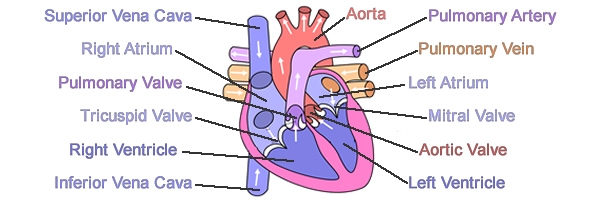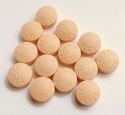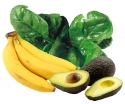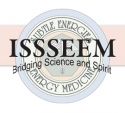Heart Health
heartdisease.jpg

Illustration by Eric Pierce / CC BY-SA 3.0
How the heart works: Blood enters the heart from the body through the inferior and superior vena cavas, and collects in the right atrium (left side of illustration). It travels through the tricuspid valve into the right ventricle, which pumps blood to the lungs through the pulmonary arteries. In the lungs, the blood drops off carbon dioxide and picks up oxygen and then returns to the left atrium. It enters the left ventricle through the mitral valve, and gets pumped back out to the body via the aorta.
Heart disease is at an all time high due to the American diet, smoking, stress and other factors. FAIM attends conferences to further the education of the public on beneficial life styles for prevention.
Vagal Tone
Heart Failure or Therapy Failure? Toxins Cause Cardiomyopathy
Heart Failure: Is it the result of life style, genetics, toxins or multiple factors?
Uric Acid
Casey Means, M.D., Chief Medical Officer of Levels, chatted with Dr. David Perlmutter on the discovery of how the elevation of uric acid in the body is a causative mechanism in the development of metabolic diseases, and one of the key links between obesity, diabetes, heart disease, neurologic diseases like dementia, ADHD, fatty liver disease, and more.
Never Suffer a Heart Attack
Do you know how to prevent plaque from forming in your arteries? Since atherosclerosis is the number one killer in the United States, learn about testing and supplements.
You've Been Lied to About LDL Cholesterol and Heart Attacks
What if something else, something entirely unrelated to any form of cholesterol, is behind plaque buildup? In that case, does lowering LDL levels play any role at all in plaque formation? And, if LDL is not what is causing plaque, what is?
6000 Steps per Day Reduces Heart Disease Risk
A new study found that between 6000 and 9000 steps per day is linked to a dramatically lower risk of heart disease in adults over the age of 60.
Myocarditis: Once Rare, Now Common
OMNS (Jan. 5, 2023) As an actively practicing clinical cardiologist for many years in three different communities, I knew about myocarditis. I just never saw it. Quite literally, I recall seeing ONE young woman who presented with a picture of acute congestive heart failure, and her echocardiogram study revealed a...
HeartMath Institute Introduction
The mission of the HeartMath Institute is to help people bring their physical, mental and emotional systems into balanced alignment with their heart’s intuitive guidance.
High Blood Pressure Packet
In the High Blood Pressure packet there is helpful information that leads you to understand the cause of high blood pressure and possible natural and complementary approaches to bring the body into a natural balance.
How Steady is Your Heart Beat?
The ability of the heart to have a variable beat is important for health. Heart rate variability (HRV) is the variability or spacing between each heartbeat. It might come as a surprise that you actually don’t want the timing in between each heartbeat to be totally consistent.
The Heart: Understanding the Vascular System, Resilience and Repair
Uplevel your understanding of the vascular system, while inviting love and wisdom into your heart.
7 Simple Ways to Unclog Your Arteries Naturally
We all want to live a long life, but did you know eating these simple foods has been proven scientifically to prevent and in some cases reverse the #1 cause of death in the modern world?
Ouabain/Strophanthus and Heart Disease
Ouabain, also called strophanthin or strophanthus, comes from the seeds of a plant in Africa. It has been used in Germany for decades to successfully treat heart disease.
A Timeline for Intravenous Disodium Edetate (chelation) as a Treatment for Vascular Disease
Chelation, from the Greek word “chele” meaning claw, implies that an organic molecule binds a cation (charged mineral) in a pincer-like fashion, removing it from the body through the kidneys. The most widely accepted use of chelation therapy is for the removal of toxic minerals such as lead from the body. In addition it is used for the treatment of all forms of atherosclerotic cardiovascular disease.
How to Effectively Manage Your High Blood Pressure
High blood pressure (hypertension) is the largest preventable and treatable risk factor for chronic disease in the world. More than 85 million people (1 in 3 adults) in the United States and more than 1 billion (40% of adults) in the world have hypertension. It is a major risk factor for stroke, heart attack, heart failure, and kidney failure. However, because it rarely produces symptoms, many people don’t know they have it, while many who have it do not control it adequately.
Is NAD+ The Fountain of Youth?
Recent research suggests that scientists may be closer to finding the silver bullet to help us preserve our youth for longer. Called the “golden nucleotide” by some scientists, nicotinamide adenine dinucleotide (NAD) plays a central role in aging.
ICIM 2019 Conference Summary: A Message from Your Heart
The 2019 ICIM Conference offered a complete education on cardiovascular disease, new ways to address atherosclerosis, risk factors, metabolic markers, and new ideas for treatment. ICIM offers education to practitioners and patients who want to learn the latest in preventative, alternative, and innovative treatments.
10 Signs of Magnesium Deficiency
Magnesium is one of the most abundant minerals in the human body and is used in over 300 different physiological processes. Unfortunately, magnesium is also one of the most pervasive deficiencies in our society today. Could the lack of magnesium be influencing your health negatively? This article breaks down the signs of a magnesium deficiency and the best ways to get more in your diet.
Hidden Epidemic
Infected teeth, infected gums, infected tonsils, and even infected sinuses always cause enough discomfort to drive us to a physician or dentist, but none of these are life-threatening... right? Wrong! In fact, dead wrong! They often kill, and they typically do it in a silent fashion.
Doctors Reverse Decades Old Aspirin Recommendation
New cardiovascular disease prevention guidelines submitted jointly by the American College of Cardiology and the American Heart Associated and published in the Journal of the American College of Cardiology contradict decades of routine medical advice by explicitly advising against the daily use of low-dose or baby aspirin (75-100 mg) as a preventive health strategy against stroke or heart attack, in most cases.
The Number One Cause for 90 Percent of All Heart Attacks
The work of Dr. Hal Huggins and Dr. Boyd Haley over the past 20 years has confirmed the exceptional work that Dr. Weston Price performed almost a century ago. Their results established that deep-seated dental infections, when deprived of oxygen, produce enormously potent toxins, some of which are many-fold more toxic than even botulinum toxin when tested on their ability to inhibit critical human enzymes involved in energy production. This bacterial seeding is precisely why inflammation "starts" in the coronary artery leading to heart disease.
Holistic Oral Health Summit with Jonathan Landsman
Dental practices can be detrimental to health in ways never imagined. See what 35 professionals shared to help you make educated dental decisions.
How Cannabidiol (CBD) Can Impact Your Health
Confused about the healing effects of hemp and marijuana? Learn about the differences between the cannabinoids THC and CBD and how cannabidiol (CBD) can impact so many diseases and imbalances in the body.
Four weeks consuming coconut oil lowers risk of heart disease, stroke: Study shows
This study provides further evidence that people consuming coconut oil are at reduced risk of developing heart disease, despite claims from the AHA who base their prejudice of coconut solely on its saturated fat content and not on actual studies.
What Is A Ketogenic Diet?
Dr. Josh Axe describes what a ketogenic diet is, what is is not, and how it can work when nothing else does. He states that "medical studies are now proving that the ketogenic diet can help you lose weight, boost brain health, fight neurological disease, balance hormones, and do a whole lot more."
Truimph Over Heart Attack
Cardiologists prescribe an arsenal of drugs for heart failure but often overlook the importance of nutrient-dense, potassium-rich diet with adequate protein and supplements.
Weed
CNN's award-winning chief medical correspondent Dr. Sanjay Gupta, a chief neurosurgeon, puts medical marijuana under the microscope. All three of CNN's current "Weed" documentaries compiled into one video.
Why Coconut Oil Really Is Healthy, Despite the American Heart Association's Views
Recent articles have spawned from an article by the American Heart Association questioning the safety of coconut oil. The original AHA article restated AHA’s longstanding position against the use of saturated fats. Learn the truth about coconut oil specifically from the real experts.
What Is a Healthy Cholesterol Level?
A healthy cholesterol level is more than your total cholesterol number, says Stephen Sinatra, M.D., who stresses that it must also take into account your cholesterol fractions.
What Causes Heart Attacks
What if the conventional view that the cause of heart disease occurs in the arteries is wrong? This article describes the precise and well- documented events that actually lead to heart attacks.
A New Way of Looking at Heart Disease and Novel Treatment Options
We have an epidemic of heart disease in this country and the conventional treatments, such as the use of statin drugs and surgeries involving artery bypasses and stents, typically do not work well. So, what does?
Natural health expert Dr. Joseph Mercola interviews book author Dr. Thomas Cowan, on his book Human Heart, Cosmic Heart: A Doctor’s Quest to Understand, Treat, and Prevent Cardiovascular Disease.
Why You Should Take Your Apple Cider Vinegar at Night
While some of the amazing abilities of apple cider vinegar (ACV) are anecdotal others are corroborated by clinical studies. But how would taking “ACV” before bed help you? It has the potential to drastically improve the health and wellness of half the population.
Do You Really Need That Surgery?
With many diagnoses, pressure to do something comes from a belief that action is preferable to inaction. But the reality is that the human body can heal and that all of our actions have unintended consequences. Thus, inaction can often be the preferred course.
Put Your Heart in Your Mouth
Ouabain, Nature's Perfect but Forgotten Remedy for Heart Disease
Could it be, that the best treatment for heart disease was already discovered over 150 years ago, but nowadays even alternative medicine has forgotten about it?
A New Fighting Chance: Silver Solution
Dr. Gordon Pedersen has put together a chronicle on the cutting edge ability of structured silver solution's ability to safely destroy bacteria, viruses and yeast. Learn the application of silver for many chronic and acute illnesses.
Hydrogen Water: Drink to Better Health
Is the effect of drinking hydrogen water too good to be true? Julian Whitaker, M.D., thought so at first. But the deeper he delved into the hundreds of scientific papers examining the effects of hydrogen therapy, also called molecular hydrogen or H2 therapy, on scores of health challenges, the more he became convinced this is a true scientific breakthrough.
Don't Believe the Hype About Statin Drugs
Many doctors believe statin drugs are helpful for “secondary prevention” for patients with serious cardiovascular disease who have already suffered a heart attack or stroke. In this high-risk group, the “number needed to treat” (NNT) for statin drugs to save one life over five years is 83. Considering the toxicity of these drugs, clearly more people will be harmed than helped.
The Forbidden Fat You Should Be Eating
Dietary fats are greatly misunderstood. Most people don’t know which are healthful and which are harmful. Of all the fats, saturated fats may be among the most misunderstood of all. They’re found in red and processed meats, dairy, and eggs. Find out why they are essential and actually good for you.
Do Fats and Cholesterol Really Cause Heart Disease, or Have We Got It Wrong?
The truth is that we humans cannot live without cholesterol and animal fats! Our bodies are made out of cholesterol and fats to quite a large degree! Every cell in our bodies produces cholesterol and fats all the time during all of our lives.
Magnesium: Important in so Many Ways
Magnesium is almost as basic as air and water for healthy living. For those who are ill and magnesium deficient taking magnesium is almost like taking a breath, when one is out of air. When one combines transdermal magnesium therapy with magnesium bicarbonate water one can expect dramatic results as one would expect in an emergency room or intensive care unit when taking these medicines intravenously.
Vitamin E: A New Perspective in Nutrition and Health
The emerging research on Vitamin E suggests there is a synergistic effects when all of the aspects of Vitamin E, tocopherols and tocotrienols, are combined. Cancer, heart disease, inflammatory conditions and neurological diseases have shown benefit using a complete form of Vitamin E.
Inflammation-Aging Link Confirmed
Inflammation is vital to healing. The heat, tenderness, swelling and redness surrounding a wound show us that the body is marshaling its healing response. However, in many people, inflammation has escaped its local, temporary boundaries and is happening throughout the body, all the time.
Avoid the Metformin Bandwagon
What are the preferred natural alternatives to metformin? The botanical berberine stands out as the obvious number one alternative. Berberine is safer and equal to or superior to metformin. For example, for treatment of type-2 diabetes, insulin resistance and the high lipid levels resulting from insulin resistance, berberine is equal (in blood sugar and insulin resistance regulating effect) or superior (in lowering high lipids) to metformin. For heart disease Berberine has not been reported to cause low blood sugar, vitamin B12 or folate deficiency, raise homocysteine levels, or increase the risk of heart attacks.
Innovations in Nitric Oxide Diagnostics and Therapeutics
It is well-documented that the most prevalent cardiovascular, metabolic and cognitive disorders impacting healthcare are largely the result of the loss of available nitric oxide (NO) in the body. NO deficiency is the basis for endothelial dysfunction which underlies the development of these disorders that plague the population. Consequently, NO is considered the molecule that now offers the means for profoundly altering the disturbing trends in public health.
The Great Cholesterol Myth Cookbook
The Great Cholesterol Myth Cookbook provides a detailed, yet easy-to-understand explanation of what it really means to eat for heart health. Authors Stephen Sinatra, MD, Jonny Bowden, PhD, and Deirdre Rawlings, ND, PhD provide a robust, detailed meal plan and roadmap to prevent and reverse heart disease.
Folate vs. Folic Acid
Discover the stunning truth behind this essential "vitamin" – and the simple switch that's much, much better for you.
Dispelling the Big Fat Myths: Part 1
There are many misconceptions about dietary fats and oils. This is unfortunate because fats are absolutely essential to maintain optimal health. Learn the importance of fats and which ones to avoid.
Dispelling the Big Fat Myths: Part 2
There are many misconceptions about dietary fats and oils. This is unfortunate because fats are absolutely essential to maintain optimal health. Learn which fats are good for you.
Lifestyle for Longevity
What is a good lifestyle to insure great heart health and long life? Should you eat saturated fats or not? Does your cholesterol really matter? How much exercise is necessary? Read what Stephen Sinatra, M.D., cardiologist, has to share and take the Heart Health Questionnaire to see how you fare.
Meaningful Blood Tests for Cardiovascular Risk Assessment
Could an array of blood tests other than cholesterol tell you the most about your heart health? Learn the latest about tests that will help you monitor your heart health before you are stricken with a heart attack or stroke.
Beware of NSAIDs, Especially After a Heart Attack
NSAIDs (non-steroidal anti-inflammatories) have the potential to affect the kidneys and liver, contribute to high blood pressure in women, and cause intestinal bleeding. Some research suggests that NSAIDs are cardio-toxic. Stephen Sinatra, M.D., warns patients not to take them on a regular basis for any length of time.
Sidestepping Stroke: The Sinatra Prevention Plan
More than three quarters of a million Americans are affected by stroke each year and the deficits encountered by survivors make stroke a leading cause of functional disability. Stephen Sinatra, M.D. offers a comprehensive stroke prevention plan.
The Great Cholesterol Myth
Learn how to look at cholesterol and heart disease differently. This book is vital for anyone with heart disease, high cholesterol, taking statins, or if you simply want to protect yourself from heart disease in the future.
Reversing Heart Disease
Learn about the world's very best treatments for arteriosclerosis known as hardening of the arteries via plaque deposits.
What's Cooking? Nutritional Series
Heart MD Institute has launched a cooking video series with Dr. Sinatra and his son, Step, preparing heart-healthy organic meals.
Why Women Should Stop Their Cholesterol Lowering Medication
Dr. Mark Hyman discusses a study in the Archives of Internal Medicine that found statins increase the risk of getting diabetes by 71 percent in post-menopausal women. Since diabetes is a major cause of heart disease, this study calls into question current recommendations and guidelines for women to take statins to prevent heart attacks (called primary prevention) and suggests they may do more harm than good.
Hormonal Heart Help
David Williams, M.D., introduces Strodival (ouabain) as a way to stop angina and help prevent the situation from progressing to a full-blown, possibly fatal, heart attack.
EECP for Angina and Heart Failure
Enhanced External Counterpulsation (EECP) is a non-invasive procedure for patients with angina or known coronary artery disease.
G-Strophanthin: A "New" Approach for Heart Disease
An African plant called "strophanthin gratus" has proven to be very effective for angina pectoris and myocardial infarction. This is backed by much research and actual results in clinics. But the benefits of strophanthin relate to more than just heart disease.
Devil in the Milk Research Update
In this article Keith Woodford, author of the Devil in the Milk, provides updates on recent research on BCM7, what he calls "the milk devil."
Heart Failure Roundup: The CoQ10, Fish Oil, Statin Connection
Stephen Sinatra, M.D. shares information on the role that CoQ10, fish oil and other supplements play in heart health. He takes a close look at statin drugs and cholesterol. FAIM's goal is to help broaden perspectives through education and thanks Sinatra for sharing this vital information with our readers.
Cardiovascular Health and CRP: Statins Are Not the Answer
Julian Whitaker, M.D., stresses the therapeutic powers of diet, nutrition, exercise, and all-natural hormonal and dietary supplements in a balanced approach to health and wellness. He addresses heart disease, cholesterol and the common blood test for inflammation, C-Reactive Protein and the use of statin drugs. Are they friend or foe?
Heart MD Institute
Heart MD Institute is a free online educational resource about integrative medicine. Dr. Stephen Sinatra, a board certified cardiologist, certified nutrition specialist, certified bioenergetic psychotherapist and anti-aging specialist, founded Heart MD Institute to promote a medicinal model based on integrative strategies and inspire the "inner healers" within everyone.
Devil in the Milk
FAIM is always on the lookout for interesting concepts in health. It has come to our attention that there is a possible issue with milk. Since the public consumes so much dairy we felt it was important to share Keith Woodford's research.
Dr. Stephen Sinatra on Food and Earthing
Dr. Sinatra studies heart disease from a nontraditional perspective, immersing himself in the study of bioenergetic analysis, nutrition and healthy lifestyle to achieve speedier recoveries and improved health for his patients.
ISSSEEM Conference on Sacred Synthesis: Science with Heart
The theme for 2009 ISSSEEM conference was "Sacred Synthesis: Science with Heart." ISSSEEM is an interdisciplinary society with interest in the energetic component within many disciplines including quantum physics, therapeutic modalities, healing, psychology, consciousness, and the understanding of our multidimensional existence.
American College for Advancement in Medicine Conference on Cardiovascular Disease
Titled, "Cardiovascular Disease and Inflammation: an Integrative Approach," the American College for Advancement in Medicine (ACAM) event drew nationally and internationally known physicians and research experts to teach practicing clinicians about the latest breakthroughs and scientific advances relevant to the treatment of cardiovascular disease.
Fourfold Path to Healing, Raleigh, North Carolina
At a time in history when strongly held nutritional beliefs are beginning to be questioned, information shared at the Fourfold Path to Healing Conference shed new light on healthy living, eating and movement.




































































